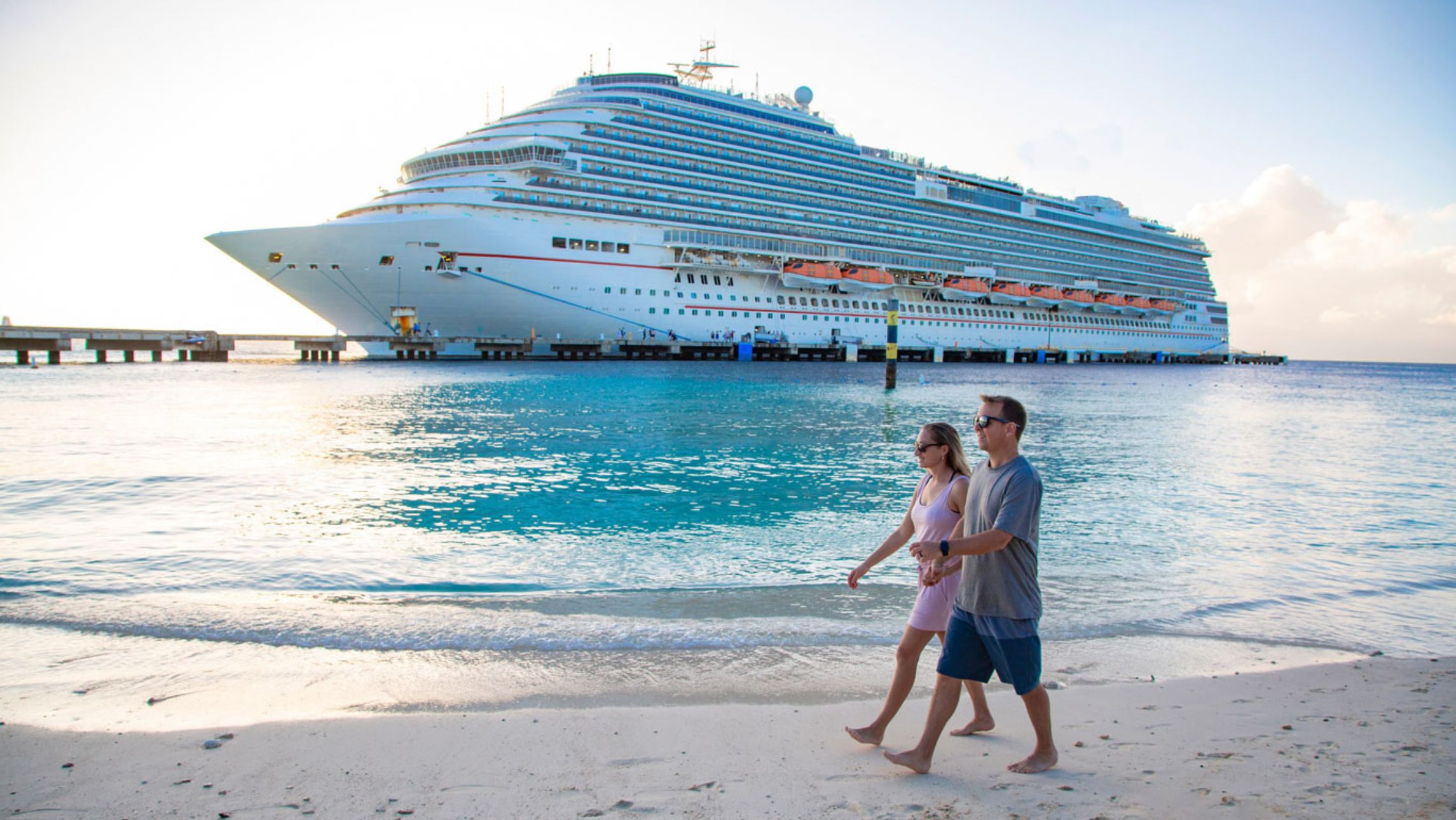Exorbitant insurance premiums and complicated policies are making it harder for older cruisers to set off on their beloved holidays.
Last week, after Cruise Passenger highlighted the problem, thousands of readers read the story and many got in touch about their own personal situation.
Cruise Passenger reader 76-year-old Steve Snell is a long-time cruiser, currently with four itineraries booked. However, trying to find insurance for these travels has been far from smooth sailing.
“At the moment I’m booked for a cruise on the Majestic (Princess), November 25, which has been cancelled and pushed back twice. I started looking into cruise COVID insurance and 1Cover which came up as $1062 for a 13-day trip to New Zealand.”
And while the $1062 fee already shocked Mr Snell for a short trip over the Tasman, he was then astonished at the prices he was quoted for the other three cruises.
“We’re back again on the Majestic Princess on March 31 to Vancouver. We decided to take that way as we are then flying from there to New York and picking up the Norwegian Prima, which sails to Iceland and then ends up in Southampton.
“I had no idea what it would come out to when looking at the different rates, I had a look at 1Cover again, it came out at about $10,000.
“This afternoon I went into HCF and that came up at nearly $9000.”
Mr Snell says as far as these and further booked cruises go, if the insurance premiums don’t come down, he simply won’t opt to cruise.
“We’re also on the Celebrity Edge on January 24. But right at this moment, my wife says we are not going to be paying $10,000 for insurance. And I also agree. This is a death threat to the cruise industry.”
Mr Snell has also been recommended to try NIB and CoverMore but has been unable to get through to them via telephone and explain his situation.
An avid cruiser, Mr Snell’s situation has now reached the point of discouragement and continued reconsideration of travelling the way he loves.
“I find it very discouraging; we were so excited, and a lot of work has gone into this. We’ve had four or five cancellations. You do start to feel depressed at the struggles and the battles you have.
“The big question is, are we going to pay that sort of insurance for these trips. The answer is no. We’re fine otherwise to travel, but we are cruisers, we’ve got four cruises booked you know.”
At its core, Mr Snell views his predicament as price gouging and an alienation of older travellers.
“I think it’s price gouging. I think it’s discrimination. I understand we’re all getting older, but it’s odds and evens isn’t it. It’s like private health insurance, you pay your money, you may get ill you may not. I think there’s definitely price gouging going on for sure.
“You can’t cruise without cruise COVID insurance. We’re going to Bali in four weeks’ time and Jetstar insurance through AIG, was only $184 each.
“That was one kind of relief, but it just showed how much gouging is really going on.”
What do the experts say?
Compare the Market’s travel insurance expert Warren Duke says it’s an unfortunate reality that the combination of a cruise in the current climate and an older traveller can lead to insurance premiums skyrocketing.
“Unfortunately, many older travellers have pre-existing medical conditions and covering those conditions does cost extra due to the higher likelihood of a medical claim.
“The cost can be high, but is crucial on cruise ships where cover under the Medicare scheme is not accessible. Weather conditions at sea can also create trouble for passengers, increasing the likelihood of falls and injuries.
“If you do need special medical treatment or treatment that is not available on board, it’s possible you will be dropped off at a port, which means insurers might consider repatriating you back home. This comes at a considerable cost.”
Mr Duke says to an extent, it’s simply a numbers games for insurers and if claims are happening more frequently from certain demographics, premiums may shoot up.
“Most insurance companies have a wealth of data based on past claims and this helps them determine the likelihood of future claims and how large those claims might be. Insurers utilise many factors to determine the price at which they are willing to insure a particular individual.
A number of factors are considered including your destination, how you’ll be getting around, how long you are travelling for, as well as demographic factors such as age, and whether travellers have any pre-existing conditions.”
A number of factors are considered including your destination, how you’ll be getting around, how long you are travelling for, as well as demographic factors such as age, and whether travellers have any pre-existing conditions.”
As to whether there’s price gouging happening, Canstar’s finance and insurance expert Steve Mickenbecker, says it’s a hard call.
“It’s bound to be expensive. But is it justified at that price? I couldn’t even make that call.
There are a lot of insurers providing cruise insurance, it’s quite a competitive market. Is it price gouging? I couldn’t say.”
I always expected very significant increases in costs when insurers came back on board.”
For those getting insurance through other methods such as health funds and credit cards, Mr Mickenbecker just warns to be cautious.
“Some of the credit cards for example, aren’t quite as good in their policies as the others, but you can get reasonable cover.
Like any other insurance policy, you’ve got to look at the fine print. But in terms of medical cover, they tend to be reasonable.”
As a final tip, Mr Mickenbecker says it’s probably best to plan even further ahead with insurance at the moment and get a quote before you start spending any other money.
“With quotes like those, they do change the nature of the holiday, don’t they? I always say to people, as soon as you start parting with cash that’s non-refundable, that’s the time to start taking out an insurance policy, but probably that’s not perfect in cases like this.
“It’s when you’re planning your trip, that’s the time to at least get the quotes to make sure that you can do it, because that becomes a real affordability issue.
You might end up being forced to consider if another holiday is better suited.”
Mr Duke says one other way to get costs down is to fine tune your policy.
“Make sure you’re covered adequately without going above and beyond what you need.
You can fine-tune your policy to make sure you’re not paying for things you don’t need. If you’re carrying $2,500 in luggage, it would be excessive to insure your luggage for $15,000.”
Customers can also reduce their premium by increasing their excess, should they wish to take the risk. The trade-off is that they will have to pay more in the event of a claim.”











Hi today I managed telephone contact with Allianz. It was by default as I had rung HCF Travel Insurance as we are members.
HCF I established are underwritten by Allianz.
After extensive coverage of all aspects for Covid Cruise Insurance we moved to my first cruise location New Zealand for a HCF quote.
Comprehensive with Cruise Package. you would think Comprehensive would cover all it doesn’t so make sure you have cruise package included.
$1364.68
I responded with this is higher than two other quotes.
I then asked to quote Allianz.
$621.27
These are facts.
I would like to extend thanks to Andrew at Allianz. we spent nearly one and a half hours going through everything. His professionalism, patience and listening ability outstanding.
Hi
Thank you for your responses and from those who have confirmed their experience of high quotes and poor customer service.
Using the HCF quote form you put your membership number in supposedly to activate the discount.
I will add comment on responsibility which at the moment is in denial with cruise companies and insurance companies seemingly taking advantage.
Facts
We all need to be fully vaccinated including crew.
The Government approved cruising based on all considered safety information
Cruising has continued overseas during Covid. Statistics would be available to cruise and insurance companies on risk
In more recent times and out of Australia there has been the requirement to be fully vaccinated.
It is currently said Flu is a bigger threat than Covid.
Does everybody need to have had the Flu injection to cruise? No
So why do the cruise companies insist on the travel requirements
Insurance to cover Cruising and Covid?
It is time to remove it?
This will stop the gouging and increase competition where customer service will be essential to be in the race.
Cruise companies need to resolve these issues or lose a lot of business.
Do we as Cruisers believe it is okay to pay 25%+ of what your cruise fare is in insurance.
I certainly don’t
We hope for calm waters ahead.
Hi Lorraine
Thank you for your response.
We are credit card holders with Citi.
The card travel insurance is with Allianz.
I have failed to get through to Allianz trying a number of times and waiting up to half an hour.
I contacted Citi to find out why they do not have a hot line to Allianz or somebody in their office.
The response” we are a finance house not an insurance company that’s why you need to contact Allianz”
Then I was put through to an operator who hung in on a call to Allianz.
After 15 minutes I said this is a waste of time and we hung up.
It appears there are too many excuses for not giving customer service and needs to be fixed.
We do our travel insurance with the Bridge Club (you need to be a member or have a friend or family who is) Tony Bemrose Insurance Brokers/ ABF Insurance ,we get a whole year & last time it was about $3,500 for the both of us, that was 2020 when all was cancelled, they gave us a refund., I was 78 & my husband 82 he has a lot of pre existing medical problems his part makes it high as my part was only $750, I only have Type 2 Diabetes & hypertension . have had the policy sent again this year & they are covering for Covid , however we are only taking a trip from Sydney to Cairns & back using our FCC’s decided not to have travel insurance as we will only be a day from a port in Australia & can get back home easily (borders are not shut). I do not think my husband will be travelling overseas again I would still like to travel as I am a very fit & young 80, the policy does have restrictions for over 80 can go away as many times as you like as long as it is no more than 45 days under 80 you can be away for 90 days, too many people have heart problems.
Did mr Snell book his cruises through travel agent lr direct ?
In my 30 years as an agent it was quite common for agent’s to offer a discount on travel insurance to their cruise clients. Most pre-existing conditilons shuld be well controlled by medication,so to pay extra for cover of these is of doubtful value.The Cover purchased should be purely for unforseen events such as missed connections,accidental injuries,possibly emergency return home due to death of a near relative.
Cruise prices through an agent should be exactly the same as those offered by the cruise line, possibly less if the agent has a group discount agreement with the cruise line.
” who are you going to ring if there’s a problem” why not use your local lass or bloke ?
Eric Bottle retired pharmacist and licenced travel agent
( & cruise-aholic)
He could always try talking to a Travel Agent about insurance. We have access to multiple policies that we can compare on the spot.
We are going on the same cruise as Mr Snell on November 25 to New Zealand. I have had an online quote for cruise & covid cover from Allianz Global which came in between $500/$600. We are of the same age. Hope this helps.
My wife & I agree wholeheartedly with the above comments from Mr & Mrs Snell. Of similar age, we are getting quotes of $9,000 to $10,000 and that is without requiring pre-existing medical cover. We are continuing with our cruise bookings at present only to use the credits from cruises cancelled by Princess. If travel insurance remains at this high cost, we will be reviewing our future travel plans. Many of our friends have already decided not to travel anymore due to the cost of insurance. With the ageing population, cruise companies are going to miss out on a lot of customers in future if the cruise industry does not get together to make the insurance more available. Forget going to Covermore. From our experience, they do not respond to communications. We are still searching for a reasonable insurance cover.
My ANZ Visa card gives us travel insurance, underwritten by Allianz, up to 81 years provided we pay $250 towards our trip using said card. And trip is no longer than 180 days.
Probus members can get travel insurance with covid cover, reasonably priced, also underwritten by Allianz. No age limit.
CoverMore, last year, quoted $10600+ for 2022 world cruise, Sydney to Sydney, purely on age and time away – I’d hate to imagine what they would’ve quoted if we had any pre-existing health conditions.
I have previously sent a comment on travel insurance to New Zealand. I noticed that auto correct spelt “Alliance” not Allianz Global.
I got annual cover for 4 Aust/NZcruises including one departing Singapore for myself 72 & husband 74 for Aust $ 2074 from Goinsurance, and they do answer their phone!
HCF members can get 25% off the price of their travel insurance policies.
How much does it cost to buy a car? $5,000? $100,000? How much does car insurance cost? $50 a month or $250 a month? Hmm . . same with travel insurance. They are NOT all the same so premiums are not all the same. Also, insurers can’t accurately calculate premiums without risk data. ie what are the chances. Just look up the ages of those who have been categorized as having been hospitalized for or died from covid. There’s your risk data! Then it’s down to the wording – what’s covered, what’s excluded, the sub limits, etc. I’ve seen covid covered but restricted to as little as 1500 Euros in total. An evac from a ship could cost more than that, even simply for an ambulance from wharf to hospital. That spent, then where’s your covid cover? All used up. Seen them cover only whilst on board. Get it before travel or on the way to the ship – nothing. Off the ship and on the way home – nothing. Seen them cover only medical – nothing for lost travel and new travel expenses. Insurance prices and wordings must be seen together. BTW I’ve also seen unknown pre-existing illnesses excluded. This means if you had covid, even if you had no symptoms etc and did not know, then the claim excluded. If an Australian policy, this pre-existing conditions clause can be put in a policy but cannot be enforced unless a reasonable person in the circumstances should have been aware / suspicious before taking out the insurance. eg you have a very bad cough before you took it out. These days a reasonable person might take a covid test.
I ended up getting my insurance through Allianz as my normal insurance isn’t currently covering cruises. Not sure if they cover other parts of the world but they are covering our cruise to New Zealand.
Had quotes for insurance of $9000 from two companies then tried Allianz and their quote was $3700 for the same thing.
-Limited flight options/greater demand for medical resources means higher fares in an urgent medical claim, to get dealt with straight away.
-Greater PPE use and special requirements e.g. handling/quarantine mean claim costs rise
-Border changes/special requirements, and on/off covid/medical restrictions means greater risk (more chance of it happening).
And someone claiming expects to be covered whatever the cost, which means significant price rises. Can’t see it’s gouging, just insurers aren’t a charity and don’t want to be out of pocket when claims arise.
If you are an HCF member, you can get a 25% discount on their travel insurance which is quite substantial. You need to look in their rewards section to get the code for the discount.
If you are in Australia you should probably try RACV insurance.
I switched to them for cruise insurance when I found that they cover pre-existing medical conditions for a slightly higher premium. You don’t have to be a member to insure with them